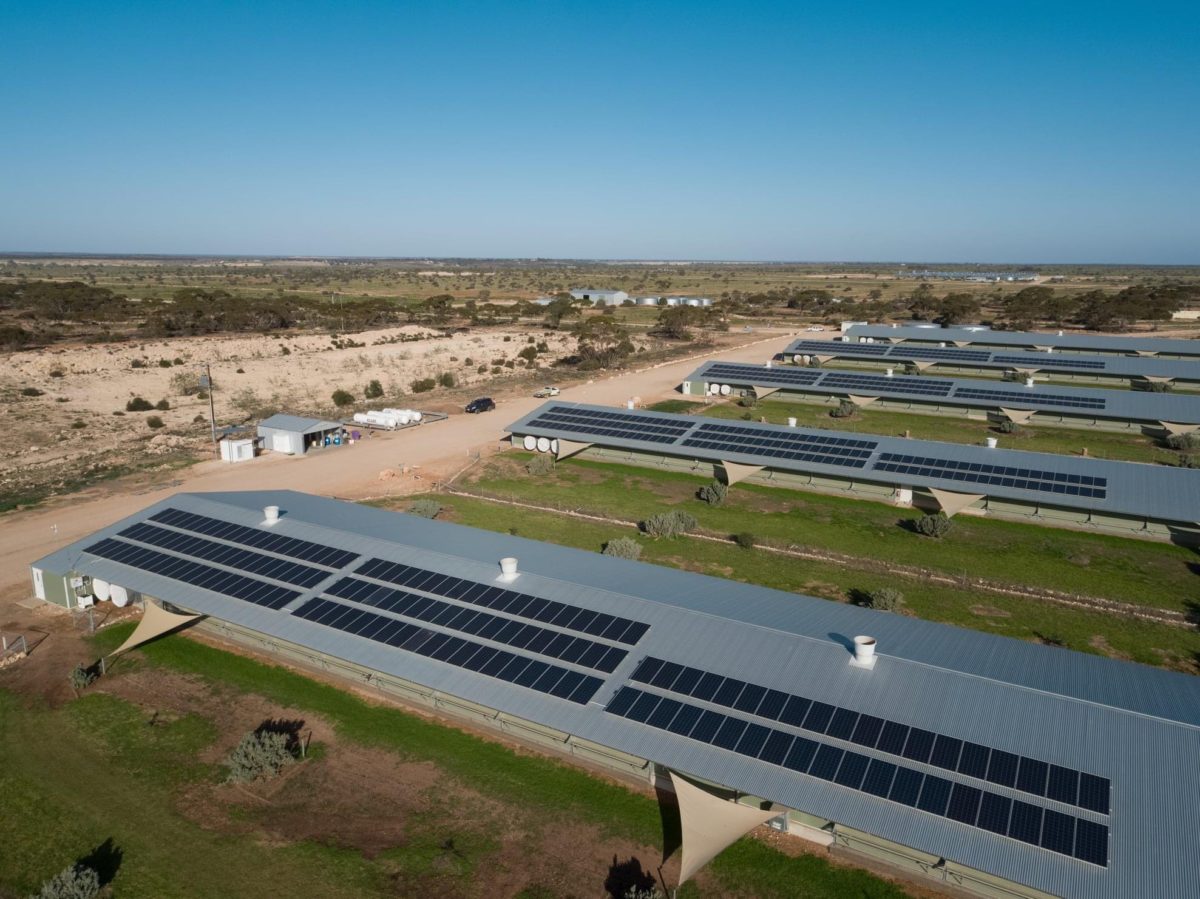The Riverlands Free Range poultry complex (Riverlands) on the Murray River near Blanchetown in South Australia (SA) is Australia’s biggest free-range chicken farm. This means that there is more head-banging going on at Riverlands than at any music festival in the country, and this week they actually have something to bang their heads about.
Of course, industrial farming practices are not usually something we, as a nation of chicken-shop lovers, like to keep front of mind, but last week saw AAM, the investment group which owns the farm, switch on 1.4 MW of solar panels arrayed across extensive shed rooftops in tandem with a 2.28 MWh Tesla lithium-ion battery system, a combo that could reduce the farm’s consumption by 70%.
AAM’s managing director Garry Edwards told BeefCentral that he believes the energy storage system is the largest of any installed on a commercial farm in the country and that the combined system, which will reduce greenhouse gas emissions by up to 970 tonnes of CO2, will also allow Riverlands to run on renewable energy approximately 65% of the time.
AAM’s Ben Edser told the ABC that the entire energy sustainability project cost close to $5 million, but “Before we put the system in, our cost of energy imported from the network was getting toward $1 million.” Which signifies are pretty quick 5-year turn-around on investment for the project.
AAM’s Riverlands Free Range is the new home for a 2.28MWh #Tesla lithium-ion battery system. This is part of extensive #sustainability & #renewable energy projects across Southern Cross Poultry Fund assets.
Read more :https://t.co/91ga26rmYy#investments #australianagriculture pic.twitter.com/waLsGCmdyE
— AAM Investment Group (@AAMInvestments) July 9, 2020
AAM has $300 million in regional assets, including the Regional Livestock Exchange, and raises about 20 million RSPCA-certified chickens at Riverlands each year for Ingham’s. The chooks have the run of 42 sheds and outdoor areas now sporting 1.4 MW of solar and five Tesla batteries thanks to a $1.3 million in support from the SA Government’s Energy Productivity Program.
With such a system’s distributed energy capabilities AAM has also developed its own energy management system. “Whilst we might be an energy generator at one site,” said Edser, “we might be an energy consumer at another. So, it’s really how we blend and manage that load and use power within the complex, but also taking into account what’s the voltage and what are the network prices doing.”
Regional Farming and Renewables
It has been an interesting week for the energy transition in farming. Following an announcement from ANZ bank in which it sets out a 10-year strategy to extricate itself from any new thermal coal by 2030, National Party MPs including the Minister for Agriculture, Drought and Emergency Management David Littleproud MP, and the Deputy Prime Minister Michael McCormack, released berserk rebukes on the apparent behalf of Australia’s farmers.
In the statement, Littleproud “slammed the decision by ANZ to force carbon targets on farming, resources, energy, and other regionally-based sectors as a condition of lending.” “While ANZ has confirmed with me this morning that this will not impact family farms this policy is disgraceful,” continued Littleproud, “Banks are not and should not try to become society’s moral compass and arbiter – the Australian people decide that by who they elect.”
Unfortunately for Littleproud, this is entirely incorrect. The moral compass is not orientated by democratic whim. If the study of history teaches us anything it is that moral principles are not decided by a show of hands. Of course, what is even more ridiculous in Littleproud’s little discourse on ethics is the implied notion that the nation’s moral compass is its farmers. Perhaps Littleproud needs to re-read Spinoza’s Ethics, particularly the part in which the great Enlightenment philosopher warned against ever taking moral lessons from people who ride quad-bikes.
And yet on the other hand Riverlands is an example of how government, investors, the private sector, and agriculture can, in the words of Edwards, “collaborate to develop innovative solutions that create a platform that will benefit the agricultural industry, the environment and the broader community.”
This content is protected by copyright and may not be reused. If you want to cooperate with us and would like to reuse some of our content, please contact: editors@pv-magazine.com.









3 comments
By submitting this form you agree to pv magazine using your data for the purposes of publishing your comment.
Your personal data will only be disclosed or otherwise transmitted to third parties for the purposes of spam filtering or if this is necessary for technical maintenance of the website. Any other transfer to third parties will not take place unless this is justified on the basis of applicable data protection regulations or if pv magazine is legally obliged to do so.
You may revoke this consent at any time with effect for the future, in which case your personal data will be deleted immediately. Otherwise, your data will be deleted if pv magazine has processed your request or the purpose of data storage is fulfilled.
Further information on data privacy can be found in our Data Protection Policy.